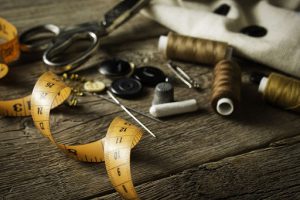AKAP Accreditation Organization

$250.00


A tailor is a person who makes, repairs, or alters clothing professionally, especially suits and men’s clothing. They may create new pieces of clothing from patterns and designs or alter existing garments to fit customers better. They work for textile and apparel manufacturers, department stores, and dry cleaners.
The term so used thus refers to a set of specific hand and machine sewing and pressing techniques that are unique to the construction of traditional jackets.
Small and medium size retail tailors often provide their services internationally, with individual tailors and cutters travelling to various cities, allowing the customers to be met locally, measured on one trip, fitted on another and thereafter supplied with (a) garment(s) without the inconvenience of themselves travelling overseas.
Even small tailoring businesses without an international following will sometimes travel from one city to another within their home country, and quite a number will visit customers at the customers’ places of work or homes.
Tailors typically do the following:
1-Measure clients to ensure that clothing will fit properly.
2-Cut and measure fabric according to a pattern or design.
3-Mark garments to note where alterations are necessary.
4-Open seams to hem garments and to make other alterations.
5-Sew clothing by hand, using a needle and thread or with sewing machines.
6-Fit clothing on customers to determine if additional alterations are necessary.
Local tailoring is as the name implies. Typically the tailors are met locally and the garment produced locally. This method enables the tailors to take professional measurements, assess posture and body shape to make unique modifications to the garment.
Local tailors will typically have a showroom or shopfront allowing clients to choose fabrics from samples or return the garment easily should it require further modification. This is the most traditional form of tailoring.
Distance tailoring involves ordering a garment from an out-of-town tailors enabling cheaper labour to be used. In practice this can now be done on a global scale via e-commerce websites.
Unlike local tailoring, customers must take their own measurements, fabric selection must be made from a photo and if further alterations are required the garment must be shipped. Today, the most common platform for distance tailoring is via online tailors.
Online tailors sometimes offer to pay for needed alterations at local tailors. Another new option is the concept where a free suit mock-up is made to the provided measurements and shipped to the customer first.
The suit mock-up can be tried on and worn to see where any adjustments are wanted. The final suit is then tailored to the new specifications provided by the suit mock-up fitting.
Tailors use their knowledge of garment construction and style to fit, alter, and create garments to client specifications. They read patterns, use measuring tools, and work with different fabrics and embellishments in the course of their work. Experienced tailors know how to hand-sew and machine-sew garments for both male and female customers.
Most tailors work full time for clothing stores, dry cleaners, apparel manufacturers, and maintenance services. However, some own and operate their own tailoring service. Although this occupation requires a great deal of skill, many tailors have little to no post secondary education.
Tailors use measuring tools to measure bodies and fabrics to fit clothes to individual customers. They record measurements and perform measurement operations (add, subtract, multiply, and divide) to ensure proper fit of garments.
Tailors work with a variety of customers and fabrics. They need good measurement and communication skills to conduct fittings, and fashion design and sewing skills to make and alter garments. Many employers prefer candidates with the following skills:
Measurement skills
Tailors work with a variety of measuring tools, including tape, rulers, and curves; measurement accuracy and precision is required to ensure garments are not destroyed during the alteration process
Sewing ability
In addition to sewing garments by hand, tailors also use sewing machines to make garments and perform alterations. They work with a variety of embellishments, such as beads and buttons, and a wide range of fabrics, including knit and leather
Hand-eye coordination
Tailors work with needles, thread, and small items like buttons; this requires good vision and manual dexterity
Creativity
Making custom-fit garments that are both functional and stylish requires creativity, strong color perception, and an eye for fashion
Communication skills
Tailors need excellent verbal communication skills to effectively and sensitively advise clients on the fit and style of garments
Tools of the Trade
We evaluate and assess tailor certificate in our organization.
You can be accredited and get personal skill certificate by AKAP Accreditation Organization.
Benefits of Tailor certificate:
Join to AKAP community for get your Tailor certificate.